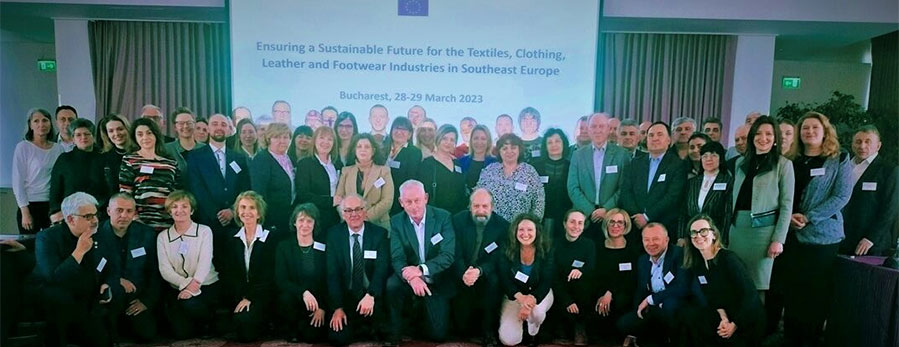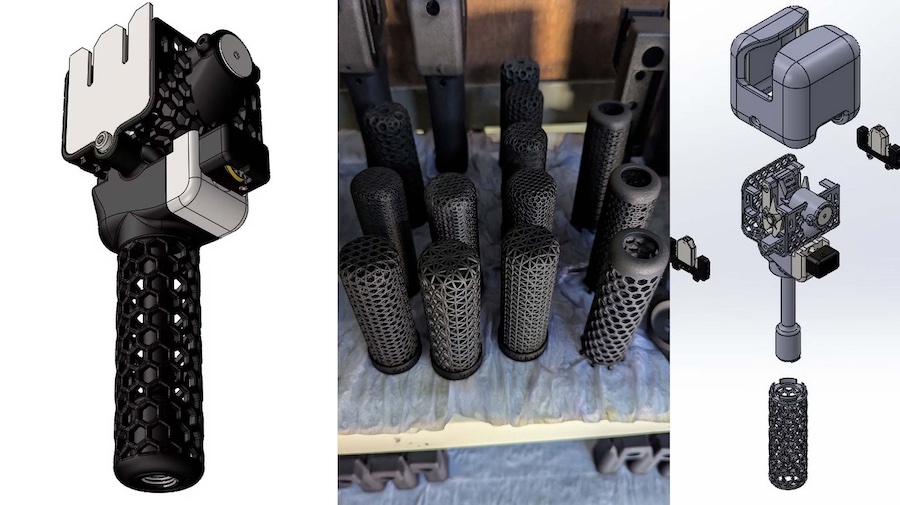#Associations
Towards sustainable and competitive TCLF industries with decent jobs in Southeast Europe

The importance of strong social partners and quality social dialogue was underlined by the signing of the Bucharest Declaration. The declaration commits social partners to strengthen their engagement and joint work for a positive future for both employers and workers.
The conference brought together social partners, sectoral experts and other stakeholders as part of an ongoing EU social dialogue project. The project focuses on transforming the Southeast European TCLF sectors into more sustainable industries, while facing significant challenges such as an uneven global playing field, high energy costs, an old workforce difficult to be replaced because of the lack of the sectors’ attraction for young generations, unfair purchasing practices by major brands and increasing pressure on wages.
The TCLF sectors are of enormous importance in Southeast Europe, employing around 400,000 workers. With the EU Sustainable Textiles Strategy insisting that all textile products on the EU market, including footwear and leather fashion goods, are ‘sustainable’ by 2030, there is an urgent need for the TCLF industries in Southeast Europe to transform.
Strong social partners are essential in planning and managing the transition of these industries. The signing of the Bucharest Declaration by national and European social partners therefore marked a major step forward in social dialogue, with social partners committing to work together to ensure a successful green and digital transformation of the industry, harnessing growth opportunities while ensuring decent work for all.
Luc Triangle, industriAll Europe General Secretary said:
“Trade unions insist that the transition to more sustainable TCLF industries in Southeast Europe is managed in a socially responsible way. The transition will only be sustainable and just if it delivers for people and the planet. For us, this means ensuring that no worker is left behind in the green and digital transitions. With wages in the TCLF industries among the lowest in Europe, now is the time to work towards a transformed industry with better working conditions and wages for workers.’’
The Bucharest Declaration also includes a joint call from the social partners to national governments to strengthen their industrial policies, hand in hand with social partners, and to support innovation and digitalisation.
Dirk Vantyghem, EURATEX Director General, said:
“To ensure a successful future for the textile and clothing industry in South East Europe, we need to focus on four aspects. First, national authorities should recognise the strategic importance of the whole sector. Secondly, we should ensure better dialogue among entrepreneurs, workers, brands and authorities. Thirdly, companies need to rethink their business model, focusing on sustainability, quality and creativity. Lastly, we need stronger business associations, who can support and represent textile companies in front of national and international actors.”
With all social partners highlighting the problems of attracting and retaining skilled workers, a panel discussion was held on the role of education and skills, as well as on what could be done to make understand students, families and the society in general the opportunities of a professional career in the TCLF sectors, which include decent wages and good working conditions, but not only. By signing the Bucharest Declaration, social partners offered to work with public authorities and educational institutions to provide the necessary means to attract, train and/or reskill workers, including through concrete support from the EU’s TCLF Pact for Skills.
Carmen Arias, Secretary General of CEC, said:
“People are the essence of the TCLF industries, and employees should feel proud and welcomed to work in our companies. Investments in human capital are needed: on their skills in one hand, with the support of a strong collaboration between companies and education stakeholders, and also on their wellbeing with flexible conditions adapted to their specific needs, and a prosper career path. In addition, the circular and digital transformation of companies can contribute to enhance the attractiveness of the sectors, in which young workers can find a modern and welcoming workplace with similar interests and values.”
The important role of brands and retailers sourcing from Southeast Europe was also highlighted, with the Bucharest Declaration calling on them to contribute to positive change through responsible business practices, due diligence and support for social dialogue and living wages.
Gustavo Gonzalez-Quijano, Secretary General of COTANCE, said:
“The EU Social Partners of the TCLF ecosystem have done their part in mobilising their ranks in Bulgaria, Romania, Croatia, Serbia and North Macedonia for facing the challenges of the Green Deal. Now the ball is in the camp of the Governments in these countries for supporting their industry with effective strategies complementing the EU strategy for the TCLF sector.”
Following the international workshop, national social partners will continue their increased engagement through the implementation of social partner-led national action plans, which should also be supported by national policy makers. The European social partners committed to continue to support their national affiliates at European level, including helping them to prepare for the implementation of key EU legislation such as the EU Directive on adequate minimum wages and the initiatives included in the EU Sustainable Textiles Strategy.














